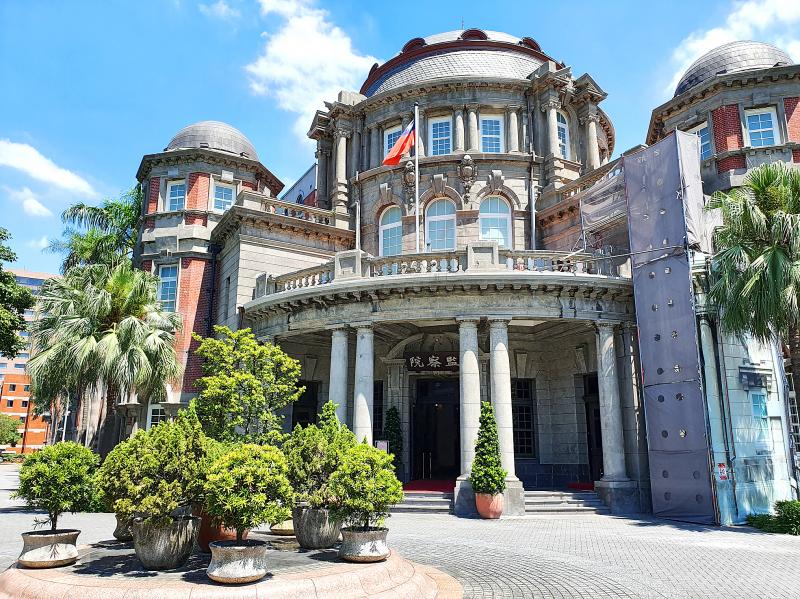The Control Yuan yesterday published data on political party finances from last year, showing more income and expenditure for the Democratic Progressive Party (DPP) than for the Chinese Nationalist Party (KMT).
According to the figures published on the Control Yuan’s public database of political contributions in Taipei, the DPP netted NT$187.46 million (US$6.43 million) and spent NT$190.61 million, while the KMT earned NT$116.61 million and spent NT$117.13 million.
The New Power Party (NPP) made NT$28.82 million and had assets totaling NT$6.2 million, more than triple the NT$1.74 million it had in 2018, the data showed.

Photo: Hsieh Chun-lin, Taipei Times
In its first filing, the Taiwan People’s Party (TPP) netted NT$81.47 million and spent NT$38.9 million, the data showed.
Of the DPP’s earnings, NT$99.69 million came from personal donations, NT$85.27 million from for-profit businesses, NT$714,000 from political donations, NT$1.78 million from anonymous donations and NT$9,067 from other sources.
The party’s account stood at NT$26.94 million, up slightly from NT$20.47 million in 2018.
The DPP spent NT$41.13 million on personnel, NT$34.05 million on business expenses, NT$90,300 on public relations, NT$78.54 million on elections, NT$30.8 million on political campaigns, NT$596,557 on miscellaneous expenditures and NT$5.42 million on donation reimbursements, the data showed.
Meanwhile, NT$63.71 million of the KMT’s income came from personal donations, NT$51.6 million from for-profit businesses, NT$845,000 from political donations, NT$457,961 from anonymous donations and NT$4,086 from other sources, the data showed.
Its account stood at NT$12.64 million, up from NT$3.54 million in 2018.
The KMT’s expenses included NT$47.61 million on personnel, NT$26.11 million on business expenses, NT$256,487 on public relations, NT$16.53 million on elections, NT$20.23 million on political campaigns, NT$732,933 on miscellaneous expenditures and NT$4.79 million on donation reimbursements, while NT$880,000 was paid into the treasury.
In its first year, the TPP netted NT$64.36 million from personal donations, NT$16.5 million from for-profit businesses, NT$300,000 from political donations, NT$312,643 from anonymous donations and NT$403 from other sources, while its total assets stood at NT$52.13 million, the database showed.
As for expenditures, the TPP spent NT$2.38 million on personnel, NT$4.69 million on business expenses, NT$79,915 on public relations, NT$19.73 million on elections, NT$8.5 million on political campaigns, NT$396,413 on miscellaneous expenses and NT$2.45 million on donation reimbursements, while NT$700,000 was paid into the treasury.
Of the NPP’s NT$28.82 million in earnings, NT$64.36 million came from personal donations, NT$597,550 from for-profit businesses, NT$920,000 from political donations, NT$3.53 million from anonymous donations and NT$2.08 million from other sources, the data showed.
The NPP spent NT$15,000 on personnel, NT$8.34 million on business expenses, NT$8.45 million on elections, NT$1.07 million on campaign contributions, NT$200,000 on miscellaneous expenses, NT$270,000 on donation reimbursements and nothing on public relations, while NT$18,748 was paid to the treasury.
The NPP had NT$3.35 million in the bank, in addition to NT$2.1 million in cash, NT$390,000 in bills receivable and NT$355,840 in nonexpendable property for assets totaling NT$6.2 million, its filings showed.
Meanwhile, the New Party made NT$6.68 million in income consisting primarily of NT$4.7 million in personal donations and NT$1.69 million in for-profit business donations, with expenditure totaling NT$6.57 million mainly due to NT$5.47 million in election costs and about NT$950,000 in public relations costs, the data showed.
The party’s account stood at NT$142,854, comparable to the NT$129,972 it had in 2018.

Taiwanese were praised for their composure after a video filmed by Taiwanese tourists capturing the moment a magnitude 7.5 earthquake struck Japan’s Aomori Prefecture went viral on social media. The video shows a hotel room shaking violently amid Monday’s quake, with objects falling to the ground. Two Taiwanese began filming with their mobile phones, while two others held the sides of a TV to prevent it from falling. When the shaking stopped, the pair calmly took down the TV and laid it flat on a tatami mat, the video shows. The video also captured the group talking about the safety of their companions bathing

US climber Alex Honnold is to attempt to scale Taipei 101 without a rope and harness in a live Netflix special on Jan. 24, the streaming platform announced on Wednesday. Accounting for the time difference, the two-hour broadcast of Honnold’s climb, called Skyscraper Live, is to air on Jan. 23 in the US, Netflix said in a statement. Honnold, 40, was the first person ever to free solo climb the 900m El Capitan rock formation in Yosemite National Park — a feat that was recorded and later made into the 2018 documentary film Free Solo. Netflix previewed Skyscraper Live in October, after videos

Starting on Jan. 1, YouBike riders must have insurance to use the service, and a six-month trial of NT$5 coupons under certain conditions would be implemented to balance bike shortages, a joint statement from transportation departments across Taipei, New Taipei City and Taoyuan announced yesterday. The rental bike system operator said that coupons would be offered to riders to rent bikes from full stations, for riders who take out an electric-assisted bike from a full station, and for riders who return a bike to an empty station. All riders with YouBike accounts are automatically eligible for the program, and each membership account

A classified Pentagon-produced, multiyear assessment — the Overmatch brief — highlighted unreported Chinese capabilities to destroy US military assets and identified US supply chain choke points, painting a disturbing picture of waning US military might, a New York Times editorial published on Monday said. US Secretary of Defense Pete Hegseth’s comments in November last year that “we lose every time” in Pentagon-conducted war games pitting the US against China further highlighted the uncertainty about the US’ capability to intervene in the event of a Chinese invasion of Taiwan. “It shows the Pentagon’s overreliance on expensive, vulnerable weapons as adversaries field cheap, technologically